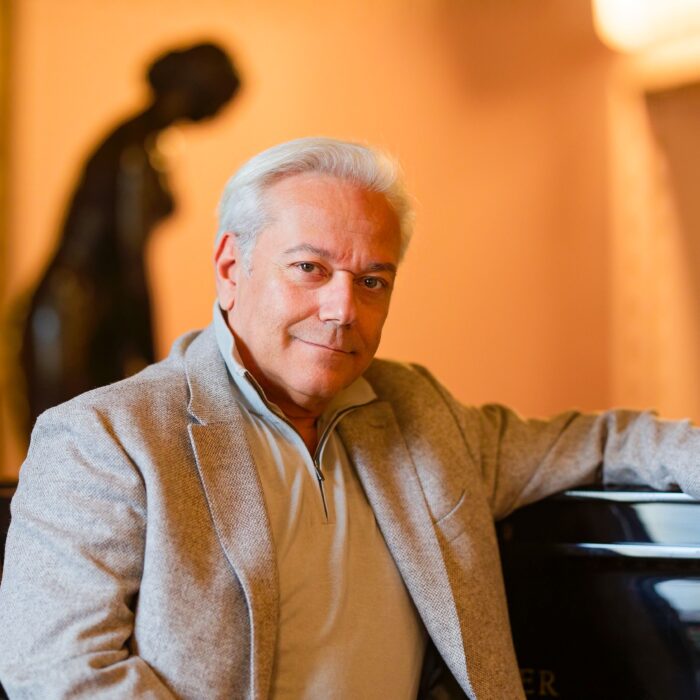
Q & A: Pinchgut Opera Artistic Director Erin Helyard On Company’s 2018-19 Season
By David SalazarBaroque opera’s popularity is growing every year. You’ve felt it. I’ve felt it. I think everyone in the opera world is feeling it. Everywhere you look, major companies are putting on more works by Handel or Monteverdi. And if those big names aren’t producing them, then you are starting to see smaller companies take on the responsibility of presenting some of the oldest creations in the this art form.
One such example is Pinchgut Opera, located in Australia and championing baroque opera since 2002. This season the company is presenting two distinct works. On one hand is the popular “Return of Ulysses” by Monteverdi, while on the other is a lesser known work, “Farnace,” which was Vivaldi’s favorite opera.
OperaWire recently had a chance to talk with the company’s Artistic Director Erin Helyard about the company’s direction this season and it’s overall growth. Helyard, as conductor, harpsichordist, and pianist has been a major champion of historically informed performance practice in Australia and around the world.
Here is what he had to say about Pinchgut Opera’s upcoming seasons.
OperaWire: Tell us a bit more about the inspirations for the Pinchgut Opera and the kinds of works it champions.
Erin Helyard: The most important and prestigious musical art-form of the seventeenth and eighteenth centuries was opera. It is was only later, in the nineteenth century, that instrumental music took over in prominence. Composers, musicians, and audiences prized opera as the best expression of all of the arts. So Pinchgut prides itself of presenting the very best of these operas—as it was the most important art-form there are just so many magnificent operas with fascinating stories, roles, and instrumental color. And composers excelled in trying to tell these stories in different ways. Pinchgut prides itself on our work with seventeenth-century Italian opera and French baroque opera, especially.
OperaWire: What is the process like for selecting each season’s works? Could you relate that process to this year’s selections?
EH: We always want to contrast our selections with what has come before, in order to present a highly varied program that will appeal to the different tastes of our audiences, but also introduce them to new genres and composers and vocalists as well. It is a delicate balance of building on our strengths and taking new risks. 2019 features two operas revolving around male characters, which contrasts with the two female characters of 2018 (Poppea and Athalia). We wanted to complete our cycle of Monteverdi operas and he is quite simply the greatest master of marrying text and music. I’m also a huge fan of Vivaldi’s vocal writing and Farnace is one of his best operas. This will be our third Vivaldi opera. The concerts are a new initiative—I’ve always wanted to explore the sacred music of this period and we will be doing that in our first concert of Bach and Telemann. But it is a great honour working with baroque opera specialists and who better than the great Vader Sabadus, a vocalist who has been on my radar for some time.
OW: In your view, what makes the two major operas you are presenting such important works, particularly in the case of a “lesser-known” opera as “Farnace?”
EH: “Return of Ulysses” is without question one of Monteverdi’s masterworks, so I don’t think I need to go into much detail here. Anyone who is interested in the composer and also the development of Venetian opera in the first half of the seventeenth century will know what an superb masterpiece this is—if you’re not familiar with it, what better than to experience it with us? “Farnace” was one of Vivaldi’s favorite operas. I think the intricate plot and orchestral color appealed to him as an impresario, and he revived it a number of times. Some of our audience might be familiar with the famous Jordi Savall recording of this opera, which in some respects was a pioneering effort in terms of the Vivaldi operatic renaissance of the last twenty years.
OW: Baroque opera endures well into the 21st century and one might argue that its popularity is growing. Why do you believe it remains so relevant to you in the 21st century?
EH: Just as we start to recognize quickly and enjoy the trademarks and techniques of a great film director after seeing a couple of their films, I think we do something similar with the works of the great baroque composers. After just a little bit of exposure, we learn to “hear” and appreciate the differing compositional techniques of Handel, Vivaldi, Cavalli, Monteverdi, Rameau, and Purcell (for example). These are enduring stories of humanity; and savoring each way each composer uniquely sets them to music is just one of the greatest joys I think we can experience.
OW: The company started in 2002. How has it grown since? What were some of the challenges of the early years?
EH: Our biggest challenge currently is keeping our company alive without government support. We rely almost exclusively on box office and donations, and that puts us in a unique position amongst arts organizations in Australia. But our audience continues to enjoy our productions and I’m delighted that this means that we can expand into other ventures that revolve around baroque vocal music.
OW: Australia has a rich opera history. How has it grown over the past 15 or so years that Pinchgut has been around?
EH: The more operatic companies and activities, the richer the “ecosystem” is for everyone. So even though it is always challenging for arts organizations and we constantly have to think on our feet, I feel that that rich history can only continue.
OW: What are some future operas that you are looking to present in future seasons?
EH: You’ll have to wait for our next season’s announcement!


